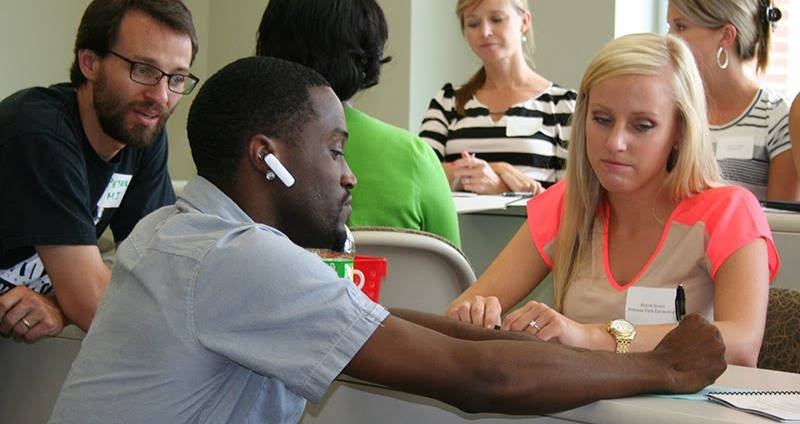Reposted from the UNCG School of Education’s Educate Magazine
The UNCG School of Education is taking a direct role in helping North Carolina’s public schools succeed by providing a variety of professional development teacher support initiatives. In addition to serving as one of the state’s primary training grounds for future educators, the School and its faculty are actively engaged with school districts across North Carolina, helping them provide better quality instruction and services to classroom teachers.
The North Carolina New Teacher Support Program works to ensure that recent graduates have a successful transition from classroom student to classroom teacher. UNCG is one of four universities across the state serving as a regional site for the New Teacher Support Program, which is funded by a Race to the Top grant.
The program is comprised of three major components: Summer professional development for incoming teachers; Coaching for first-, second- and third-year teachers; and Regional professional development. Christina O’Connor, Director of UNCG’s Project ENRICH program and Regional Director of the NC New Teacher Support Program, said the summer professional development program targets high-poverty, low-performing schools in the Asheboro City, Alamance-Burlington, Guilford County, Winston-Salem/Forsyth and Thomasville City school districts
“We give them targeted professional development,” O’Connor said. Participants in the program get five days of training in August and September in such areas as relationship-building, culturally relevant practices, classroom management and working with parents. They are the kinds of skills that exist beyond the subject matter of the course, but which can determine the success or failure of a young teacher.
Another element of the New Teacher Support Program is coaching for teachers in their first, second and third years in the profession. The UNCG coaches assist with planning and help teachers find resources. What’s more, O’Connor said, they provide independent, confidential sounding boards for the young teachers. The coaches work for UNCG, not the local school district, so a teacher can feel free sharing concerns and frustrations in confidence.
It’s all about supporting them and helping them grow,” she said. “The coaches are there for instructional support and emotional support.”
First-year teachers get more assistance than second- and third-year teachers in the program, O’Connor said.
Finally, UNCG is providing regional professional development for teachers through the New Teacher Support Program.This professional development is targeted to topics identified as areas of need. Trainers meet with teachers three times a semester, six times per year.
So why are the New Teacher Support Program and the School of Education putting so much attention on serving teachers who already have finished school? O’Connor said teaching is a profession that requires hands-on experience. So even students who receive a superb education in college still need guidance once they enter the field.
“They have left formal teacher preparation, but they are still learning,” she said. “It takes a while to become a good teacher, but the children don’t have time to wait.”
Another way that the UNCG School of Education is helping North Carolina educators is by providing monetary support for projects aimed at teacher professional development, where funding for teacher support is extremely limited. Last year, the School of Education’s Teachers Academy awarded $31,000 in University-School Teacher Education Partnership (USTEP) Grants for 11 collaborative projects in North Carolina’s public school districts.
The projects were proposed by UNCG faculty or their school partners, and the grants funded teacher research projects, training modules, and professional development to provide professional development assistance to teachers in the classrooms. Each project received a maximum grant of $3,000.
In the 2012-2013 school year, the USTEP Grants provided:
– professional development for English language arts teachers in the Alamance-Burlington Schools, using modules about the new Common Core State Standards developed by UNCG faculty. In turn, these teachers developed a teacher’s guide for the modules.
– Book study and assessment data analysis and discussions for middle and high school math teachers in the Asheboro City Schools.
– A license for TinkerPlots math materials at Greensboro’s Smith High School. Smith also received two additional grants for interviewing and videotaping exemplary Smith teachers teaching SIOP lessons and for teacher action research projects with six English and math teachers.
– Support for six teachers undertaking teacher action research projects at Southeast Guilford Middle School and Guilford Middle School.
– A professional development workshop on new standards for Health/PE teachers throughout the Guilford County Schools.
– Support in developing and teaching Project-Based Learning (PBL) units for science and social studies with 6th grade teachers at Braxton Craven Middle School in Randolph County.
– Collaboration between Dr. Kerri Richardson and elementary math teachers at Rockingham County’s Dillard Elementary in implementing the new math standards and practices.
– 20 new fifth-grade science kits for Rockford Elementary in Surry County
A new round of grants for 2013-14 was just approved. This round will support teachers for the Heritage Language Academy for English as a Second Language students in the Asheboro City Schools, sixth grade reading professional development at Reidsville Middle School in Rockingham County and science teaching at Kiser Middle School in Greensboro.
“They can use the money for all kinds of things—compensating teachers for their time, buying materials, paying for professional development,” said Dr. Barbara Levin, Director of the Teachers Academy.
Levin said the grants “are meant to enhance partnership and teacher education.” She said the Teacher Academy tries to spread out the money to as many school districts as possible. In addition, she said a successful grant application typically benefits a focused group of teachers, rather than a single teacher or an entire district.
“These mini-grants do a lot of good on the local level,” Levin said.
Written by Bruce Buchanan
Photo caption: Justin Thomas (far left) from the New Teacher Support Program leads a group discussion of first-year teachers during the Yopp Institute in June 2013
